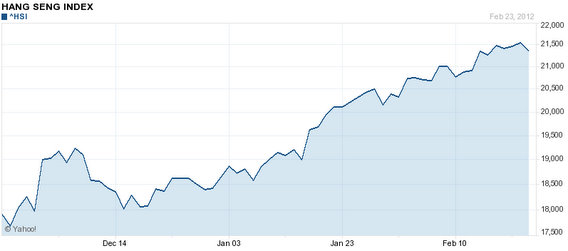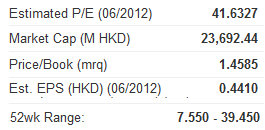Translated by Andrew Vanburen from a Chinese-language piece by Vicky Wang in Sinafinance

FOR THOSE MARKET watchers doing more watching that acting, you are running out of reasons to sit idly on the sidelines watching the headlines.
With credit becoming easier to come by in the region and its ugly twin – inflation – seemingly kept at arm’s length (for now), it may be high time to take a look at the very impressive offerings on display in the Hong Kong stock market.
Let’s not forget that the chilling specter of a potential meltdown across Europe seems to have been contained, for the time being at least, in the birthplace of democracy with a second bailout plan for Greece being approved by a growing list of EU powers (read: Germany).
Yes, we are all aware of the 17% rise in the benchmark Hang Seng Index since the calendar flipped over to 2012.
But that doesn’t mean that all 1,477 Hong Kong-listed firms -- Asia’s third largest bourse after Tokyo and Shanghai -- have been duly and fully appreciated.
Indeed, the world’s fifth biggest stock market is still a much better place to put your money in than banks or bonds, as long as you know where to put it.
On the surface, it may look like the Hang Seng may be running out of gas.
Taking the past six trading days as an example, we’ve seen that the Index broke through the 21,500 in four of these days.
That includes Thursday trade in which a high of 21,641 was hit in early morning trade, only to finish the day down 1.35% at 21,388.
Of these six days, the Index only managed to finish above the important 21,500 level at the end of one session, and then quickly gave up new gains the next morning and didn’t seriously challenge that key level again until Thursday.

Moreover, the recent thawing of both credit in the Mainland and debt fears in the EU have all been making headlines.
Yet these two positive developments failed to truly light a spark under the Hang Seng recently, even as China’s banks saw the reserve requirement ratio cut by half a percentage point on Friday.
So even though the Index has been bumping its head against a certain ceiling of late, I still think that when looked at from the perspective of individual counters, the near-term trend actually points to an upside swing.
I am no psychologist, but I do know a thing or two about the psychology of investing behavior.
Speaking from my own experience, I almost always patiently hold onto a rising counter and then only consider dumping it when it begins to waver around a near-term high.
I think this practice of mine is commonplace among the Hong Kong investing community and comes as no surprise.
The best thing that can be said of this practice is that it prevents big personal losses, especially in a particularly volatile market, and does allow for the occasional quick profit-taking to bring a mini windfall to your bank account.

But this investing psychology requires both patience and vigilance, and most importantly an investment of time – personal time – all part of the price to be paid if you want to sell when the selling’s good.
So what are the downsides to this strategy?
The most obvious shortfall is that this mentality often victimizes investors with an itchy trigger finger.
If you are gleefully tracking a rising stock in your portfolio and you sell it off in a panic the moment it has a “bad day,” you're asking for trouble.
Because as we all know, it is easier to see the bottom than the top, because clouds often obscure the summit.
And we all know there are bargain hunters out there lurking just beyond sight, in the shadows if you will, who are more than happy to pick up your rejects, knowing that you parted with them in a panic.
After all, one man’s trash is another’s treasure, and when we prematurely dump stocks, they usually bounce right back the next day – or oftentimes that same afternoon.
So these past few days I was carrying on with my normal strategy of holding on to a point, but dumping shares the moment they hit a new high and started descending.
But I also noticed that something wasn’t quite right.

Firstly, when I made my various moves, I didn’t get the feeling that others were on board with me.
In other words, I was abandoning ship alright, but I found myself with only a few other souls in the lifeboat.
Meanwhile, the band was still playing on the deck above but it was of course too late to get back on the boat.
In fact, this sort of behavior is independent of the intrinsic value of individual issues and the general optimism among investors.
Therefore, it is investing behavior like mine that is at least partly to blame for the recent inability of the Hang Seng Index to get a grip above 21,500.
Guilty as charged. But that doesn’t mean I won’t continue along the same path.
Nor does it mean I don’t remain fundamentally upbeat on the current direction of the market.
That being said, I think there are simply too many opportunities in the market these days to justify a further sit along the sidelines.
See also:
Why The Stock Market Is No Casino
Two Different Drivers In Hong Kong’s Ongoing Mini-Bull
ALEX WONG: Don’t Let Gyrations Make Gamblers Of Us







